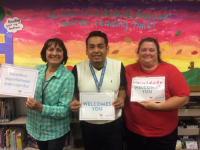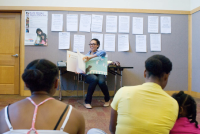Equity and Inclusion at Multnomah County Library
Multnomah County Library, Ore.
Innovation Synopsis
Multnomah County Library’s equity and inclusion program is a comprehensive effort to operationalize a system that equitably nurtures, empowers and lifts staff, patrons and the community to their highest potential.
Challenge/Opportunity
Multnomah County Library enhances a longstanding countywide effort to increase workforce diversity and provide equitable and inclusive services, with the goal of reversing historically discriminatory practices. The library proactively reaches diverse communities through culturally specific collections, programs and services and has enacted strategies, such as adding cultural competencies to job descriptions, using an equity lens in decision making and implementing implicit bias training to make the library more equitable and inclusive for staff and patrons.
Key Elements of Innovation
- Institutional commitment and culture: Allocate budget to equity, create staff equity team, new employees receive equity training, created spaces for staff to voice concerns
- Community engagement: Utilized community feedback from 14 culturally specific focus groups to set new strategic priorities, started Coffee & Conversation program to engage houseless patrons
- Workforce: Recognize lived experiences in place of formal education during recruitment process
- Digital equity and inclusion: Create public database of community-based digital services, Wi-Fi and trainings
Achieved Outcomes
- Current successes: Lead partner in regional Digital Equity Action Plan; HR participated in implicit bias training and 85 percent of new employees participated in foundational diversity and equity training; staff of color increased from 22 percent to 26 percent in one year.
- Anticipated outcomes: Re-allocate resources to hire culturally focused positions to engage underserved communities; more than 90 percent of library staff agree when surveyed that “people in my work unit value diversity”


